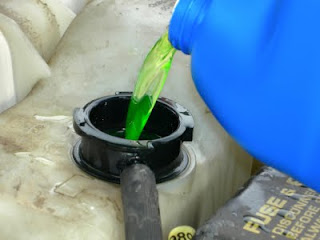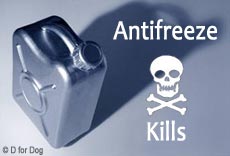If you feel fine, you may even brush off the incident as. Ingestion is the main path of entry into the body. Due to its sweet taste, antifreeze from leaking radiators or spilled bottles are quickly consumed by household pets (like dogs and cats). Antifreeze is a liquid used to cool engines.
This article discusses poisoning caused by swallowing antifreeze. DO NOT use it to treat or manage an actual poison exposure. Ethylene glycol is moderately toxic and tastes sweet being a colorless and odorless liquid. The symptoms of antifreeze toxicity typically develop in three separate stages.
Stage usually occurs within approximately hour after the dog ingested the antifreeze and can continue for up to roughly hours. The initial stage of antifreeze poisoning symptoms are the short-term effects of toxicity. These will occur just after the dog has had some antifreeze to drink, whether through a spill, a leak, or a used container that has residue. Most cases are seen in dogs and cats, but this can also occur in humans, most classically in curious children who drink antifreeze because it tastes sweet.
Slurred speech, stupor, rapid heartbeat, low blood pressure, and problems with vision, breathing and urination can also result. Identifying ethylene glycol poisoning without the owner seeing or suspecting their dog encountering antifreeze is challenging - the symptoms may apply to a wide variety of conditions, and the poison acts quickly.
Learn the symptoms and treatment of antifreeze poisoning in dogs and cats at Pet Poison Helpline. Stage poisoning happens within minutes to hours after ingestion and symptoms are similar to those seen in alcohol poisoning , including difficulty walking (staggering or “walking drunk”), euphoria or delirium, vomiting, seizures, and excessive thirst and urination. Symptoms of antifreeze poisoning may include abdominal pain. Breathing problems and irregular heartbeat are symptoms of antifreeze poisoning. The short term symptoms and the long term effects.
The effects of antifreeze are irreversible, so it is important that treatment is administered immediately to avoid the effects in the first place. The first twelve hours are the most crucial for the dog. Nephrotoxicity is the dominant effect of significant ethylene glycol poisoning. Most ethylene glycol poisonings occur with the ingestion of antifreeze.
Do not wait for poisoning symptoms to develop. Cats like drinking from ditches, puddles and ponds which means they’re prone to drinking water contaminated with antifreeze. Officially known as ethylene glycol, antifreeze is also found in some inks and snowglobes.
Untreate antifreeze poisoning can be fatal to pets. Just one teaspoon is enough to kill a cat. We look at the symptoms and treatment.
The toxin in antifreeze is ethylene glycol, which is so dangerous because it tastes sweet. Learn the signs of antifreeze poisoning in dogs and how to hopefully avoid it in the first place. Clearly you want to know your cat has been poisoned with antifreeze before this point. The signs and symptoms of antifreeze poisoning in cats can be broken down into stages: Stage starts as early as minutes after consuming the poison and lasts up to about hours post ingestion.
Cats and especially dogs are attracted to the taste of the antifreeze and will lick it off the ground. It is also called engine coolant. Early symptoms include intoxication, vomiting and abdominal pain.
Later symptoms may include a decreased level of consciousness, headache, and seizures. Long term outcomes may include kidney failure and brain damage. This occurs when animals and humans ingest the poisonous substance, ethylene glycol, found in antifreeze. It’s extremely toxic to cats and dogs. Even a small amount of antifreeze can cause kidney failure and serious damage to the nervous system.
Sadly, due to the severe effects it has on the body, antifreeze poisoning is often fatal. Sometimes, the owner will have seen his dog licking antifreeze from spills or puddles under leaking automobile radiators. Nevertheless, this may vary depending on how much antifreeze your cat consumed. That question is difficult to answer.
That is because veterinarians suspect that the majority of cases in pets probably go unreported. Older pets that develop kidney failure are often assumed to have died of some other disease. Irregular Heart beats From Dog Poisoning. Dogs with irregular heart rhythms and cardiac symptoms have most likely gotten into a medication or plant.
This includes jimson wee kalanchoe, milkwee mountain laurel and oleander. Kidney Failure From Poisoning. It may be found leaking under cars in the heat of summer or after engine maintenance. Soon after entering in the stomach antifreeze liquid gets absorbed into the bloodstream.
It may take few hours or a day for the symptoms to develop. Poisoning in cats and dogs gets a separate mention because cases of antifreeze poisoning are more common in animals than in human beings. Progression of toxicity of ethylene glycol is almost the same in animals and human beings and so are the symptoms. Treatment for antifreeze poisoning needs to be started as soon after ingestion as possible to be effective. The earlier treatment is starte the greater the chance of survival.
Once kidney failure develops, most animals will die. Dogs are most likely to be poisoned if they ingest it (though it technically can be absorbed through the skin). The chemical in antifreeze is called Ethylene Glycol.
There are many poisoning risks, including food poisoning , sun poisoning , alcohol poisoning , carbon monoxide poisoning , lead poisoning , and mercury poisoning.

At this stage, the toxins from the antifreeze may have infected the brain. These advanced symptoms include seizures and convulsions, ultimately leading to permanent brain damage and death.

What you can do when you suspect antifreeze poisoning. Dogs must be treated within 8-hours of ingesting antifreeze , as the antidote only has a narrow time period to work. Left untreate the animal may die. How do veterinarians confirm ethylene glycol poisoning ? How is antifreeze poisoning treated?
What are the symptoms of antifreeze poisoning in cats? The best time to treat is BEFORE symptoms develop! Even the smallest amount of antifreeze can cause kidney failure and death when ingested by cats.
Accidents from accidental spillages can be avoided by storing bottles safely, cleaning up spillages instantly and disposing of antifreeze products responsibly.
No comments:
Post a Comment
Note: Only a member of this blog may post a comment.